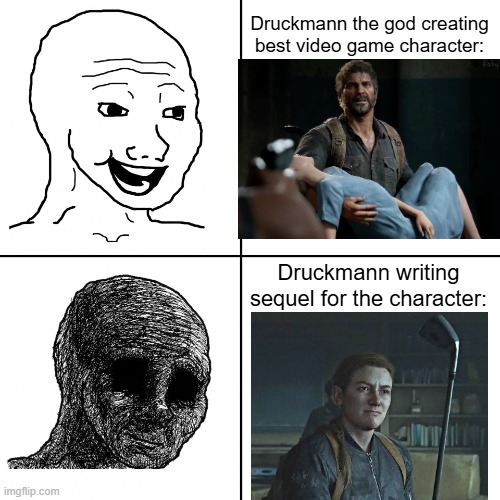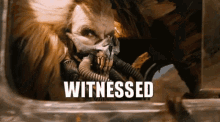LectureMaster
Has Man Musk

The Last of Us Creator Neil Druckmann Says He Never Plans for Sequels: ‘That Requires a Level of Confidence I Don’t Have’ - IGN
Earlier this week at the DICE Summit in Las Vegas, Nevada, Naughty Dog head Neil Druckmann and Sony Santa Monica head Cory Barlog sat down in front of an audience for a chat about a very personal topic: doubt.
Earlier this week at the DICE Summit in Las Vegas, Nevada, Naughty Dog head Neil Druckmann and Sony Santa Monica head Cory Barlog sat down in front of an audience for a chat about a very personal topic: doubt.
The two bantered back and forth for roughly an hour on a series of subjects that were clearly very close to both of them, ranging from their own doubts about themselves as creators to how they knew an idea was "right" or not. The two also answered a few pre-submitted audience questions, including one that Barlog read to Druckmann about sequels: "How do you and your teams approach character development over multiple games?
Druckmann's answer, though, was surprising for someone who's made quite a few sequels in his day: he doesn't think about multiple games.
"That's a very easy question for me to answer, because I never think about multiple games, because I'm the game in front of us is so all consuming," he responded. "I think you're jinxing yourself if you're starting to think about the sequel when you're working on the first game. So when I was making The Last of Us 2, yeah, sure. Every once in a while an idea pops in your head of where it might go if we get the chance to do another one. But I just approach it as, 'what if I never get to do another one?'...I'm not saving some idea for the future. If there's a cool idea, I'm doing my best to get it into here."
Ten-year payoffs
Druckmann went on to explain that this is how he approaches everything, with perhaps the exception of the The Last of Us TV show since he already knows it's going to have multiple seasons. So when sequels come around, instead of having a plan already in mind, Druckmann says he looks back on what he's already done and asks himself what elements are unresolved and where the characters can go. "And if I feel like the answer is, they can't go anywhere, then I go, 'I think we'll just kill them off.'"I'm half joking, but we just find the next game. When we made Uncharted 1, we had no idea we would do the train sequence of Uncharted 2, or where Nathan Drake would be. We figured it out when we made Uncharted 2. And eventually, the same when we worked on Uncharted 3, same when we worked on Uncharted 4, where we look back and say, "How do we not repeat ourselves? Where else could this character go? What else could get him back into the adventure?" And we have to come up with a new answer. And if we don't have a new answer then we should ask ourselves, is this the right character? Is this the right game for us to work on? Or is it time to find something new?"
"When we made Uncharted 1, we had no idea we would do the train sequence of Uncharted 2."
Barlog responded, saying he doesn't work that way at all. Barlog says he has "way too much of the Charlie Day crazy conspiracy board of trying to connect and plan with all of these pieces," and especially likes when he's able to connect something he's working on now with something he planned ten years ago.
"It's just so magical, but it is absolutely, unequivocally the most unhealthy thing ever, because it is insanely stressful to try to fold and connect each of these pieces," Barlog continued. "Because give or take five years, there's hundreds of people involved, and then a whole new group of people often are moved in on the next project. That's a bunch of different, and perspectives, and likes and dislikes that are going to negatively impact you setting something up that early. And they're going to be like, 'Let's talk about this, because that was kind of the dumb. I don't know if I want to do that.'"
"I think for me that requires a level of confidence I just don't have," Druckmann later responded. "Like this is going to be so successful, I know where this is going next. I'm like, I just want to focus on the next five days in front of me, let alone 10 years down the line."
The reason to wake up
The fireside chat spanned a number of topics, with Druckmann and Barlog discussing their own experiences with doubt, and their respective creative processes for determining when an idea is "correct." Later in the talk, they alluded to their feelings on their careers as they currently stand. Druckmann spoke on how he doesn't want to go into TV or movies permanently, sharing this anecdote about his love for games:"Since we're talking about TV, one time I gave some direction on Pedro Pascal. And I think he was frustrated by my direction, but he said it jokingly. He's like, 'Do you like art?' And I said, defensively, 'Yeah, do you like art?' And without missing a beat, he goes, 'It's the reason to wake up in the morning. It's why I live and breathe.' And to me, that's why we do it.
"...At times, I've had panic attacks. It's just so much stress, but you do it, because you love it so much. I love games so much. I love the stories we tell in games so much. It's the reason to wake up in the morning. It's why we do what we do, and despite all the negatives that come with it, sometimes the death threats and all the negativity and all those things, you just kind of dismiss those things and say, 'Yeah, but I get to make games with the most talented people. How lucky are we?'"
[/hr]


